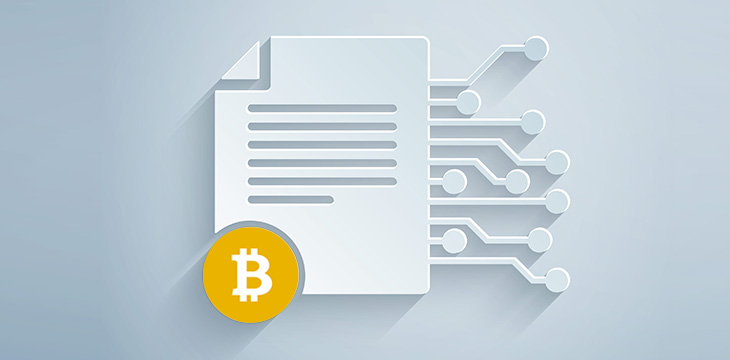The notion of a digital protocol designed to facilitate, verify, or enforce the terms of an agreement without the need of a third party is not new. In 1994, Nick Szabo coined the term “Smart Contracts” when describing this framework. It was not until the arrival of blockchain technology that the protocol’s full possibilities came into focus.
Smart contracts on the Bitcoin SV Blockchain make life easier for anyone engaging in commerce and deals. Where a direct transfer of value can be inextricably linked, blockchain smart contracts are beneficial. It provides parties the ability to conduct rule-based transactions and agreements without the need for third parties and digitally facilitate, verify, or enforce the negotiation or performance.
What is a Bitcoin Smart Contract?
A Bitcoin smart contract is a digital agreement. It is a software code stored then executed across all nodes in the Bitcoin (BSV) Blockchain network. The creator of the smart contract defines the rules and agreed upon by the involved parties. Once saved onto the blockchain, it will remain there forever, and the code at that location will never change. The Bitcoin (BSV) ledger stores and replicates the agreement giving it security and immutability.
Blockchain smart contracts not only define the rules around an agreement. Smart contracts are also responsible for automatically executing those rules and obligations. There is no central authority necessary to run the software to function seamlessly.
How to Use Smart Contracts
In plain terms, users transfer a tokenized asset or currency into a digital program that runs code to automatically validate specific conditions. Once reviewed, the smart contract automatically settles whether to transfer the asset to a new party, return to the existing party, or some other combination thereof.
Bitcoin smart contracts can:
- Function as ‘multi-signature’ accounts, so that spending funds only occurs when a required percentage of people agree
- Manage agreements between multiple parties
- Provide utility to other contracts
- Automatically trigger the sending and receipt of data to applications
Key Attributes
Bitcoin smart contracts do not automatically execute. Some form of human interaction with a smart contract’s public key triggers the code. The digital agreements can communicate with each other and influence the execution of one another. The deal is free from the influence of any external factors in that the only factors that affect the result are the agreed-upon rules and safeguards established when creating the smart contract.
Smart contracts on the Bitcoin (BSV) Blockchain network have enforcement features built-in that allow issuers to freeze, thaw and confiscate tokens. These features enable parties to manage their tokens effectively and also comply with laws and regulations. Smart contracts can process structured data from the outside of their environment through privileged actors or Oracles. The code is self-verifiable, self-executable, and tamper-proof.
Applications
The best way to visualize a smart contract is to compare it to a vending machine. Once you drop a coin in and select your option, a predefined automated routine execution results in you getting you a bag of chips.
Similarly, smart contracts, once initiated follow a predefined automated digital script that is not always visible to the users. After checking a set of predefined rules, the smart contract executes itself to produce the output automatically.
Affecting data and processes at each node of the physically dispersed Bitcoin (BSV) Blockchain network distinguishes smart contracts from standard computer programs. Once deployed, they are immutable—unlike programs stored on centralized servers, which can be tampered with or altered. The result of the execution is likewise unchangeable.
Impracticality
There are several factors to consider before interacting with a smart contract. Not every online agreement or action requires an unalterable protocol (i.e., data storage and online messaging). Activities such as these are much better administered using traditional methods. Although it can be encrypted on a shared ledger, all data is publicly available.
People are fallible by nature, whereas smart contracts are set in stone.
Every transaction involves a fee. Due to the eternal and unalterable nature of smart contracts, creators need to exercise care and caution when writing as mistakes cannot be fixed once the agreement sets on the blockchain.
Writing a new smart contract to supersede the old is the only way to make changes. The canceled contract is preserved on the blockchain so there is a record or history for posterity and transparency. This will help streamline audits as the data history can never be lost or tampered with.
Use Cases of Bitcoin Smart Contracts
Smart contracts are useful in a wide variety of domains. To explain how a smart contract works, consider the following real-life scenario.
Think about subleasing a condo you own in the near future. With smart contracts on the Bitcoin (BSV) Blockchain, your tenant can pay rent using Bitcoin. Smart contracts will manage the settlement process automatically, notifying your tenant when the rent is due on a predefined date, thereby reducing the burden on the landlord.
Once payment has been sent, the smart contract validates receiving the payment. The digital agreement issues receipts and records the transaction on the Bitcoin (BSV) ledger.
A smart contract can be programmed such that only after the lease expires and all payments are made, will the initial deposit in escrow be released back to the tenant’s account.
Another example is two parties are involved with a fantasy sports pool or betting. The smart contract can automatically payout to the winner once the contest has been decided to reduce the risk of fraud. The costs are reduced, and there is no need for third-party involvement.
Getting Started with Smart Contracts
The team at Tokenized offers a smart contract system that is expressive, secure, and capable of improving the contracting experience for all types of contracts. It also allows for full compliance with laws and regulations from all jurisdictions, as well as governance tools for managing terms and conditions, and the rights and duties of contracting parties.
Issuers can also choose if their smart contracts will operate with the support of Identity Oracles. Users can also use tokens as collateral. They can freeze their tokens such that they are unfrozen once the relevant counterparty’s signature is attached to the thaw request.
- Create and Manage Tokens
- Voting and Governance Tools
- Identity Oracles (KYC/AML/CTF)
- Safe, Secure and On-Chain
- Comply with all Regulations
- A Better Contracting UX
Tokenized smart contracts allow for token creation (e.g., share issuances), token burning (e.g., share buy-backs), token transfers, which include sending tokens, exchanging tokens for Bitcoin and swapping tokens for tokens (atomic swaps).
They also have many more features, but some of the most important ones are the tools that allow smart contracts to provide all the functionality for proper on-chain governance, enforcement, and user identification.
Bitcoin smart contracts offer a multitude of benefits beyond cryptocurrency exchange. Visit the Bitcoin SV resource site to learn more about how Satoshi Nakamoto’s vision brought us to where we are today.
Recommended for you
Tiny payments are changing the expenses landscape. Micropayments and nanopayments are not entirely new concepts and practices. But with the
You can earn money when you explore the world of Bitcoin and understand its intricacies. Once you get the hang

 03-05-2026
03-05-2026 


